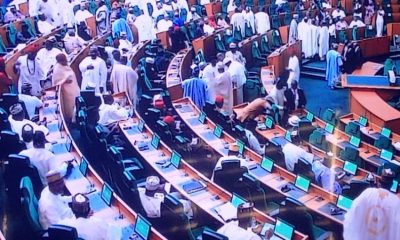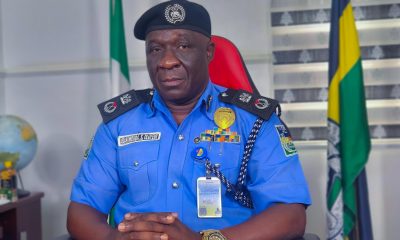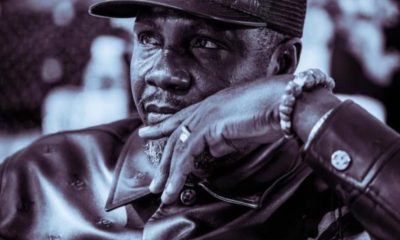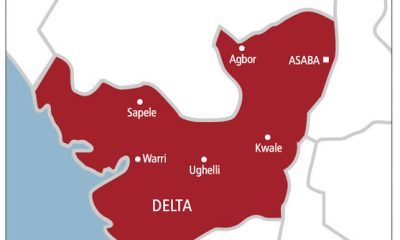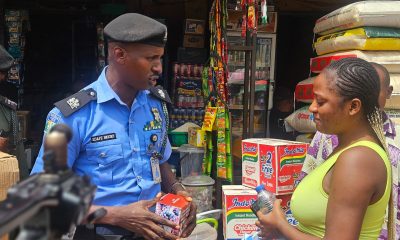National
Moves to conquer rampaging poverty around my people inspired me into writing (Interview)_Ekanpou Enewaridideke

By Peters Monday, Abuja
Educated at Ayakoromo Grammar School, Delta State University, Abraka and University of Nigeria, Nsukka, Ekanpou Enewaridideke is an award-winning Ayakoromo-born writer in Burutu LGA of Delta State, Nigeria.
He is a novelist, playwright, poet, essayist, critic, journalist and activist whose literary engagements cut across the three genres of literature as he has published works in all the three genres.
His plays include The Honourable Commissioner (2005), The Plot Against the People (2005), The Chisel and the Pen (2005), The Imprisonment of Ebi in the Coven (2005), The Strong Blood (2005), The Raffia Palm Tree (2005), A Forest of Thorns (2005), A Forest of Animals (2005), Metamorphosis (2005), The Wanted Man in Camp Four (2012), Baidia: A Family of Imbeciles (2012), You Must Leave Ekameta Tomorrow (2012) and King Maika (2012). In 2003, his play, The Raffia Palm Tree was shortlisted for BBC International Playwriting Competition.
His novels include A Sail in the Dark (2012), Spiked Beyond Spikes (2018) and a collection of short stories, The Road to Ken Saro-Wiwa, which won the ANA Delta State Isidore Okpewho Prose Prize in 2004. His collection of poems, Sandbanks in River Forcados, was also the first runner-up of ANA Delta State Tanure Ojaide Poetry Prize in 2004. His collections of essays include Dewdrops from Nigeria’s Starved Tree (2009) and Tapestry of a Dolphin (2017). Enewaridideke is widely known for his activist engagements in the Niger Delta struggle for developmental recognition in Nigeria.
In this interview conducted by Dr. Henry Obi Ajumeze as a doctoral research candidate of the Centre for African Studies, University of Cape Town, South Africa, Ekanpou Enewaridideke talks about his career as a writer, the Ijaw struggle against oppression, and his play, The Wanted Man in Camp Four:
Tell us about your birth, your parents, place of origin; did any of these in any way affect your growth as a writer and dramatist?
I thought I was born on 23rd February 1977 at Ayakoromo in Burutu Local Government Area of Delta State, but my father said I was born in 1972. A trado-medical doctor who claimed to have recorded my birthday told me I was born in 1977. Because he was fairly educated I took it as my authentic date of birth but when I brought this to the knowledge of my illiterate father in 1998, he fumed and dismissed it as a very wrong date of birth. When my father narrated the notable events and traditional festivals that marked that period I was convinced I was born in 1972 but at the time this revelation came like Wole Soyinka’s ‘Telephone Conversation’ it would be absurd for me to go back and give my birthday upward review through deliberate laceration of existing records. So I have allowed my 1977 birthday date to remain officially though my family knows that I was actually born in 1972 at a time the eye of the sky suddenly became bad, followed by a drizzle – a sign usually experienced when Ijaw warlords are bound for war with a neighbouring community or tribe having had the purification war ritual from the shrine of Egbesu. The eye of the sky became good soon after my birth; the drizzling also stopped.
My father started life as a tailor and later became a palm wine tapper. He became a transporter after years of devoted tapping of raffia palm trees in Akparemogbene. As a palm wine tapper he rose to become the first man to build a bungalow and a one-story building in Ayakoromo; and as a transporter he was the first among his contemporaries to buy a piece of land and build a bungalow in Warri. He died on 6 June 2000. My mother Mrs. Timiebi Maika Ekanpou (nee Ferebo), my father’s third wife, was a fisherwoman famed for her genius in story-telling. My head on her laps, she would tell me interesting folktales at night, intermittently awakened by me whenever sleep anaesthetized her to my presence. My mother’s folktales offered me the first apprenticeship as a writer. The stories my mother told me could be categorised as poems, plays and novels. Most of these stories are featured in my writings. My unconscious mentorship and apprenticeship through my mother’s captivating stories of incest, fratricide, regicide, murder, love, oppression, betrayal, deceit, fidelity, direction and unfaithfulness aesthetically told using the verbally channeled narrative techniques of repetition, amplification, parallelism, embedding, encoding, substitution and improvisation laid the foundation for my dramatic thrusts as a writer. These stories always find a way into my works through creative refraction after some form of metamorphosis because the stories in their raw, rugged form would not fit into my imaginative tapestry. My mother’s folktales and the events that characterise the lives of my people become my ready creative resources though the folktales and the events are invariably clothed with defamiliarization when they feature in my works. I derive inspiration from the poverty often seen around my people coupled with the efforts made to conquer the rampaging poverty. These are the underpinnings of my growth as a writer and dramatist. My illiterate mother made me a writer without being aware of the immense influence she had wielded in my literary life. I was also illiterate at the time I was listening avidly to the folktales of my illiterate mother.
It is noteworthy that I was taken to Akparemogbene three days after my birth and so all my formative days were spent in Akparemogbene and Oyangbene. Part of my primary school was spent in Akparemogbene and Oyangbene. I left Akparemogbene to continue my primary school from class five to class six and attended Ayakoromo Grammar School, Ayakoromo. Except for my secondary education, my entire life was spent in Akparemogbene and Oyangbene in Burutu Local Government Area of Delta State.
How many plays have you written so far? How many have been produced? How many have been published or unpublished? How do you project your direction as a writer in the near future?
I have fourteen plays published so far. Two of my plays, The Wanted Man in Camp Four and King Maika, have been produced at the Niger Delta University, Wilberforce Island, Bayelsa State. Notable cultural festivals in my area such as Olorogun Masquerade, Eselekere Masquerade, Awouziowu Masquerade, Peleboro Masquerade, Okeleke Masquerade and Agula Masquerade are daily battered by waves of alienation, degradation and humiliation to the extent of virtual forgetfulness and extinction. For religious purists, fundamentalists, fanatics and mentally disconnected born-again Christians who should be fittingly cast as cultural terrorists, these festivals that showcase and promote the values, ideals of our cultures, are demonic festivals that should be annihilated through verbally channeled Bible-based demonisation of their cultural values. For these inebriated, indoctrinated, religious fanatics, the annihilation of any iota of cultural celebrations is equivalent to submission of one’s entire life to God which has the brightest prospect of admission into the gate of Heaven.
Cultural degradation is looked upon as a passport to Heaven. This uncultured, shameless, reductionist approach to religion or Christianity has been equally extended to the ongoing assault, derogatory categorization and degradation of women based on their embrace of the material aspects of culture in agreement with their different cultural orientations and demands. Women who have crocodile or python tattooed on their bodies, ankles adorned with anklets, multiple earrings on the upper parts of both ears, the nose pierced and adorned with ring as culturally permissible beauty-enhancement adornments, are derogatorily categorised as prostitutes, demonic agents animated by morbid passion for blood-sucking and destruction, morally depraved persons, uncultured fools, etc. For a mere mode of dressing created as part of beauty-enhancement measures, women have been derogated as prostitutes by religious purists and sanctimonious men when it is even clearly stated in the Bible that ‘cleanliness is next to Godliness’, which can be given different cultural expressions in their styles of dressing. The pathological degradation and demonisation of women based on their dressing sense or taste, which is culturally determined, demands correctional antidote so the dignity of womanhood would not be whimsically degraded.
The Niger Delta is the most degraded and exploited region in the world. How to communicate this degradation, oppression and exploitation to the world in search of corresponding solutions is a moral task for any writer who sees writing as a service to humanity. How to rescue the African culture from the consuming convoluted traps of python-like religious purists who are always on rampage, how to eradicate the indignities women suffer on account of their culturally expressed modes of dressing and how to salvage the Niger Delta region from the oppressive, exploitative, pulverizing, fangs of the oil companies and insensitive governments would be charted by me as a course in the nearest future, if not already now.
What informs your choice of drama as a major mode of literary expression? Does this throw back to your upbringing and education?
Drama is not my major mode of literary expression. Poetry and prose are equally channels for my literary expression. In fact, my literary expression began with prose. My work, The Road to Ken Saro-Wiwa (a collection of short stories), won the ISIDORE OKPEWHO prize for Literature in 2004 – the same year my collection of poems, Sand Banks in River Forcados, emerged as the first runner-up of TANURE OJAIDE prize for poetry organized by Association of Nigerian Authors.
A Sail in the Dark is another prose work by me. My choice of drama as a mode of literary expression is occasioned by constraints of subject matter handled. Certain issues are more effectively communicated when drama is employed. I employ drama as a mode of literary expression when I am convinced, creatively convinced, that it can best communicate and transmit my message to the readers. My mother’s folktales, creatively refracted, form the base of my literary expressions. These stories embody canoe songs, work songs, hunting songs, war songs and children songs; and these songs have dramatic elements out of which dramas could be created. At the university, I studied English and Literary studies which exposed me to poems, plays and novels from Africa and other continents of the world. Mrs. Timiebi Maika Ekanpou’s folktales and my study of English and Literary Studies were veritable sources of apprenticeship for me in my engagement of drama as a literary expression.
What is your educational qualification and how does this impact on your creativity?
I was educated at the Delta State University, Abraka, where I had B.A (English) and University of Nigeria, Nsukka, where I had M.A (English). The raw material of writing which I got from Ayakoromo Grammar School was refined at DELSU into poems, plays, novels and critical essays. This raw material was further refined at UNN into a play, novel and critical essays. My DELSU voyage produced literary works just as my UNN voyage equally produced literary works. DELSU and UNN have become two refineries for production of literary pieces. I am ‘BALAMED’, barricaded, as a writer without DELSU and UNN. I am clothed by DELSU and UNN. Just as Mrs. Timiebi Maika Ekanpou is to me so are DELSU and UNN. DELSU and UNN are agents of refinement and nourishment for the ‘illiterate seeds’ unconsciously sown at Akparemogbene by my illiterate mother.
Which of your plays best accommodates your aspiration as a writer? I am speaking here of philosophical and ideological convictions?
The play, The Wanted Man in Camp Four, best accommodates my aspiration as a writer – whether you call it philosophical or ideological conviction. Egbesu is the god of war that only fights justly against oppressive, exploitative, manipulation of the Ijaws in Nigeria. Egbesu is a force, a spirit, a mystical juggernaut, a positive angelic force, that can never be defeated and pulverised no matter the sophistication of the technological pulverisation mechanism deployed. It is a phoenix in certain degrees of comparative analysis, a hydra-headed force whose multiple heads appear as swiftly as they are caught off. Mystically, Egbesu forms the supportive base for the agitations in the Niger Delta. The invincible protective umbrella of Egbesu is always unfurled over every genuine Ijaw agitator in the Niger Delta. The vociferous aggressiveness, fearlessness, consistency, of Ijaw freedom activists, is derived from the invincibility of Egbesu as long as the struggle is not tainted with transgressions against the directional codes of Egbesu chronicled and preserved in the shrine in the grove. The agitation for development in the Niger Delta region spearheaded by Tompolo which led to the declaration of Amnesty for the freedom fighters in 2009 is a justifiable one – which must not be demonised as a calculated self-enrichment engagement. Some vindictive writers try to demonise the Niger Delta struggle led by Tompolo in 2009 but I creatively put it in the right perspective.
The agitation in the Niger Delta would always resurrect if the developmental issues that gave birth to it are only whimsically and palliatively subjected to cosmetic surgical operation targeted to create a semblance of sensitivity to the region. The current resurgence of violence in the Niger Delta emanates from the lack of pragmatic connection with my message in the play. Obscenities, barbarities – economic, political, social, psychological, ideological and developmental – systematically unleashed on a people always fuel agitation. The wanted man in The Wanted Man in Camp Four will always be a wanted man if the key issues are not sincerely addressed. Turbulence would not desert Niger Delta region as long as underdevelopment will not desert Niger Delta; and as long as underdevelopment would be upon the Niger Delta as moon and sun upon the earth, Egbesu will perpetually emerge as the EBOZO for the Ijaws and chart the mystically navigable course for the genuine agitators. So in my own play, The Wanted Man in Camp Four, foregrounded is the invincibility of Egbesu and the justness of the agitation in the Niger Delta. As a writer I believe this is the channel for my creative canoe to canoe bravely as a further guide for their liberation aspirations when unjustifiably pushed to the wall.
What can you say about your Delta Origin in relation to Nigerian society, and how does the concern of that relation find expression in your dramatist oeuvre?
The Delta region is a region rich in oil resources where the inhabitants who live in shacks are always exploited by the oil companies and the Federal Government. Because the region is constantly exploited and pauperized, the people are always tempted to take up arms against the Federal Government as the money generated from their region is taken to develop other parts of the country that do not have crude oil. The militant agitation of late Isaac Boro and Tompolo against the Federal Republic of Nigeria was fuelled by the impoverishment in the region. Isaac Boro led armed struggle against the Federal Government of Nigeria in 1966 and later died under mysterious circumstances after the struggle; High Chief Government Ekpemupolo (Tompolo) moved against the Federal Government in 2009 and later took amnesty offered by the late President Umaru Musa Yar Adua. Today Tompolo is a peacemaker in the Niger Delta. The issues of underdevelopment that fuelled the militant agitations are yet to be sincerely addressed. The insensitivity of the Federal Government of Nigeria to the key issues of underdevelopment in the Niger and the probability of violent agitation from the people have often featured as a timely warning and guide for the readers so the dangerous ‘ABIKUISM’ in the relationship between the people of the Niger Delta region and the Federal Government of Nigeria would be total eliminated for a sunshine. Whether or not the Niger Delta origin should be turbulent or calm is a choice for the government of Nigeria which has the knife. Because the Niger Delta is constantly sucked dry by the government and the oil companies, it deserves manumission from the pains of underdevelopment; because the Nigerian government is insensitive to the plight of Niger Delta, the pen has become my arm deployed in my dramatic oeuvre to sensitise the people to always chart a progressive direction.
You received your higher education at Delta State University. Can one trace the deployment of poetry and songs in your plays to J.P Clark Bekederemo’s influence? And what line will you draw, especially in terms of language, between these influences and your Niger Delta Origin? What does Niger Delta bring to your work?
The Ijaws are always poetic in their verbal expressions. There is poetry in my mother’s folktales; there is poetry in the songs of Ijaw people. Any writer of Ijaw extraction could tap from this rich OKILOLOBEINI of flowing poetry. JP Clark’s plays challenge people to go back to their roots for enrichment. Niger Delta enriches my works with images and endless tales of exploitation of their oil resources. Niger Delta influences the totality of my works. JP Clark’s plays are intriguingly loaded with electrifying poetry and I like them. I am inspired by JP Clark to visit the roots for poetry. One could say there is JP Clark influence; there is Ijaw influence. JP Clark awakened me to the fact that the Ijaws are naturally poetic. I searched my roots for confirmation of JP Clark’s position and discovered that the Ijaws are naturally very poetic. For confirmation, casually listen to the songs of Ijaw professional musicians like late King Robert Ebizimor, late Bestman Doupere, Honourable Teyeibo Agbeotu, Sir Smooth Godfrey, Fred Eniyekenimi, King Alfred Izon-ebi, Grandmaster Freetown Pereama, Barrister Soja Smooth, King Pius Fezena Alabeni, late Professor I.K Belemu, late Chief Echoe Tokumo and Imperator Omoko Ogbemudia. Seeing that my people are naturally poetic, I simply tap from the poetic OKIOLOBEINI (cascading water from the forest when the tide is going out) where JP Clark had tapped from and still continues to tap from until he ages away to Dueamabou (land of the dead).
The deployment of poetry and songs in my plays are echoes from the Niger Delta region and my language conditioned by the natural poetry of my Ijaw people. I am merely walking on the virgin path JP Clark had long cleared for me though ownership of the resources deployed in the communication of my messages belongs to my Ijaw roots. Niger Delta brings imagistic nourishment and reinforcement into my work; it also predisposes me to constant castigation of the government and the oil companies for being unrepentantly insensitive to the developmental stasis, developmental retardation, plaguing the region. Beyond the imagistic nourishment and the predisposition to constant criticism of the oppressors, Niger Delta brings into my works the sufferings, the hopes and aspirations of the people of the Niger Delta region.
Let me come back a little more to your language and your penchant for poetry – how do you define your audience in this respect in terms of accessing the meaning of your performance if framed in highly poetic metaphorisation? Who is your audience?
I believe that language should be dexterously deployed to broaden the intellectual horizon of readers through defamiliarization. A reader should always be captivated and enriched by the language deployed in a text, not by its pedantic, bombastic, sophistication and depth. Language achieves this objective of captivation and intellectual nourishment when it is philosophically spiked with poetry. I am writing for people who have pledged allegiance to Literature and all its components; people who want to enjoy Literature; people who are determined to read and enjoy Literature no matter the inherent intimidating piyoryor-eyebo (spikes) and igalibo (protuberances on wood) in the work. Therefore, I am writing for anybody who picks up my works to read. My language is accessible to every lover of Literature and so I do not have a defined audience. You are my audience as long as you know how to look up the meanings of words used in a text. In terms of my language deployed in my works in relation to the audience, I believe I belong to everybody and nobody in particular.
First published by Vanguard newspaper.

